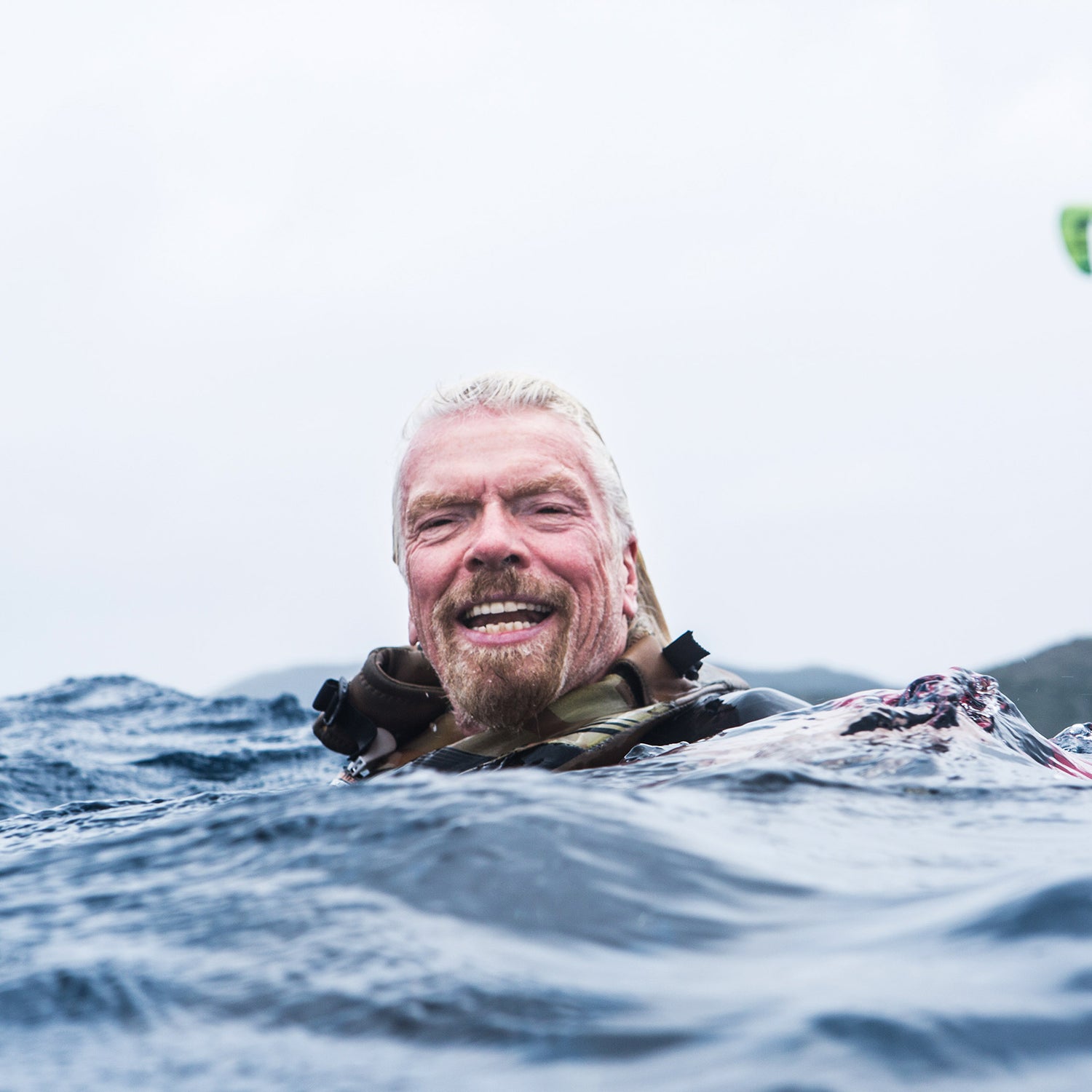, the founder and chairman of The Virgin Group, is a world-famous entrepreneur, adventurer, activist, and business icon. His new autobiography, , which he considers a sequel of sorts to his 1998 book, , shares the candid details of a lifetime of triumphs and failures, and provides an intimate look at his never-ending quest to push boundaries, break rules, and seek new frontiers.
In an extended conversation for an episode of the , Ferriss asked Branson about the lessons he learned from his parents, how he maintains his super-high energy levels, his tactics for managing risks, and much more. Below is an excerpt of their conversation, edited by ║┌┴Ž│į╣Ž═°.
I read a story about you some years ago that said you might hold the record for the number of highly publicized near-death experiences. It cites experiences like being pulled from the sea by helicopters during your attempts to circle the globe in a hot-air balloon, crashing into the Algerian desert, and on and on. When you are in circumstances like that, or in a basement during a hurricane like you were when Irma struck your home on Necker Island, what do you say to people who are panicking? What do you do?
I think humor is important. Putting on a brave face, cracking jokes, plenty of hugs. Hugs are important. But I think when youŌĆÖre all down in the bunker, just to try to reassure them that even 200-mile-an-hour winds are not going to bring a concrete bunker down. With some of the other adventures where we were in a capsule flying around the world, many things went wrong. There were just two of us, generally. Both of you have got to keep the spirits of the other person up.
The only way youŌĆÖre going to survive is by keeping focused, by staying positive. Even if youŌĆÖre facing almost certain death. YouŌĆÖre definitely going to die unless you┬Āfight to the bitter end. There have been circumstances where on paper we had a well over 90 percent chance of not coming home. I think by staying focused, by staying positive, and with a big dose of good fortune, we made it all the way back.
You seem to exercise a lot. IŌĆÖve seen you just go for hours and hours skiing, swimming around Necker Island, kiteboarding. What are the practices or habits that help you keep your level of energy and output as high as it is over so many years? ┬Ā
Looking after yourself is obviously absolutely key. Everything stems from how healthy and well you are, both physically, mentally, and so on. I generally do it through sport. I wake up early in the morning on the island and play a very hard game of singles tennis against somebody who is better than me. I might go kite surfing and then have breakfast and the day begins. IŌĆÖll repeat that most likely later on in the day and maybe swim around the island as well.
As a family, my kids are now taking my adventurous streak on board. Every year, they set us a challenge which we do together. In 2016, we started at the Matterhorn, in Switzerland, and did an eight-day hike across the mountains. We then got on bicycles and rode 100 miles a day all the way from the north of Italy to the southernmost tip. Then swam to Sicily. Then we did another bike ride, a marathon, and ended up at the top of Mount Etna. It took us a month. I was shattered about halfway through it. But by the end of it, I felt like a 25-year-old. ┬Ā
Your mother wrote a book called , which includes stories about her disguising herself as a boy to take glider lessons, joining the WomenŌĆÖs Royal Navy Service, and working as a hostess on British South American Airways. What was she like when you were growing up?
First of all, IŌĆÖm lucky. I have a very extraordinary mother and a lovely father. WeŌĆÖre a very close-knit family, which gave me a fantastic foundation. My motherŌĆÖs approach in bringing up her children was one where she wouldŌĆÖve been arrested today. In those days, she could get away with it. When I was age four or five, she would shove me out of the car two or three miles from GrandmotherŌĆÖs house and tell me to make my own way there. She would put me on a bicycle at age seven or eight and tell me to ride many miles in the pouring rain, again, to GrandmotherŌĆÖs house. Her attitude was if we survived, weŌĆÖd be the stronger for it.
She wouldnŌĆÖt allow us to watch television. We had to get out there and do things. So she pushed us out of the house and told us to come back in the evening: ŌĆ£Get out there and climb trees, rescue cats, and IŌĆÖll see you tonight.ŌĆØ We lived in the countryside and it was a fun upbringing. A very loving upbringing. It may not sound like it. She wasnŌĆÖt actually trying to kill us. She did love us as well.
Many people see you as an entrepreneur who throws caution to the wind and bets the farm on many things. But youŌĆÖre actually a master of risk mitigation, something that comes through clearly when you describe how you got into the airline business. Can you tell the story of launching Virgin Atlantic in the 1980s?
Well, I was in my 20s. IŌĆÖd been away from my girlfriend for three weeks and I was coming back to see her. I was in Puerto Rico at about 6:00 in the evening, heading to the Virgin Islands. American Airlines announced that they were going to bump the flight to the next morning because they didnŌĆÖt have enough passengers. I was damned if I was going to wait that long. So I went to the back of the airport and I rented a plane, hoping that my credit card wouldnŌĆÖt bounce. Then I borrowed a blackboard and, as a joke, I wrote, ŌĆ£Virgin Airlines, one way, $29 or $39 to the British Virgin Islands.ŌĆØ I went out amongst all the people that had been bumped and I filled up my first plane. When we landed later that that night, one of the passengers tapped me on the shoulder and said, ŌĆ£Sharpen up your service a bit, Richard, and you could be in the airline business.ŌĆØ
That got me thinking. Most airlines donŌĆÖt look after people. The staff generally donŌĆÖt smile. The food is dreadful. The next morning, I was on Necker Island and I rang up Boeing. I asked to talk to the sales department. A wonderful man, who I got to know very well, called R.J. Wilson answered the phone. The call went roughly like this. I said, ŌĆ£My name is Richard Branson. IŌĆÖm interested in buying a second-hand 747.ŌĆØ R.J. Wilson said, ŌĆ£Look, would you mind telling me what you do?ŌĆØ
I said, ŌĆ£IŌĆÖm in the record business. IŌĆÖve got the Rolling Stones. IŌĆÖve got the Sex Pistols. IŌĆÖve got Janet Jackson and lots of wonderful artists.ŌĆØ I could sort of feel that he thought I was wasting his time. He said, ŌĆ£And youŌĆÖre based in?ŌĆØ I said, ŌĆ£Our companies are based in England.ŌĆØ
I later learned that he carried on talking with me because Boeing was fed up with British Airways always legging it over them because they had no competition. He was thinking that maybe by having a competitor to British Airways, theyŌĆÖd have a bit more leverage. So he said, ŌĆ£We do happen to have one second-hand 747. But I really feel you should change the name. With a name like Virgin, people will think youŌĆÖre not going to go the whole way.ŌĆØ I said, ŌĆ£Thank you for your advice. IŌĆÖll think about that.ŌĆØ
I then talked to my record company team. They went into complete panic mode. I mean, what on earth is Richard doing thinking of taking us into the airline business? We have the most successful independent record label in the world. HeŌĆÖs going to put everything at risk. What I said to them was, ŌĆ£Look, I promise that IŌĆÖll only go into the airline business if I can persuade Boeing to let me hand the plane back at the end of the first year to protect the downside.ŌĆØ I knew the worst that could happen would be that Virgin Records would lose six months of the profits. Boeing agreed to it.
When the end of the first year came, instead of handing the plane back, we ended up buying a couple more second-hand 747s. Over the years since, weŌĆÖve bought hundreds of planes for three or four different airlines.
How has a failure or an apparent failure set you up for later success?
I think on the adventure side, the first time we crossed the Atlantic in a boat. We were trying to break a record for the fastest crossing of the Atlantic. We sank. Then we built another boat and we were successful. The British people love people who are underdogs. It taught me that actually failing and then being successful was mostly better than just going out there and being successful the first time around. ┬Ā
What belief, behavior, or habit has most improved your life?
When I was a kid, if I ever said anything ill about anybody, my parents would sit me in front of the mirror for ten minutes in order to let me know how badly it reflected on me. So IŌĆÖd like to think IŌĆÖve generally never spoken ill about other people. I think thatŌĆÖs been one of the best bits of advice that IŌĆÖve ever received, and obviously then given.


